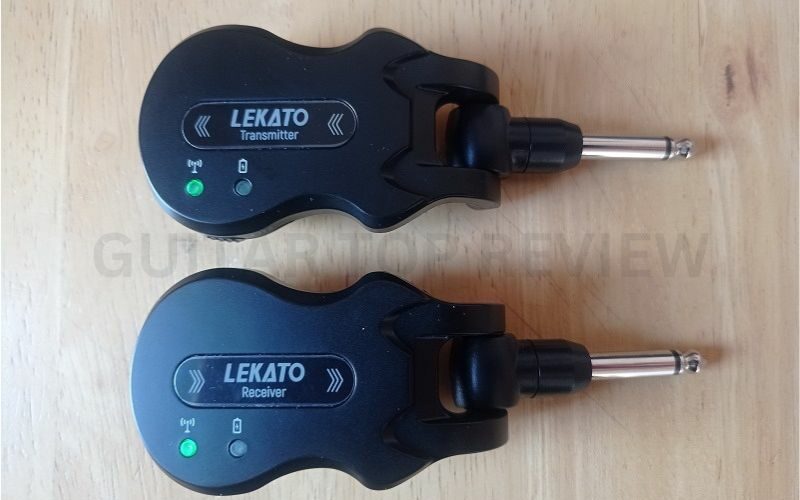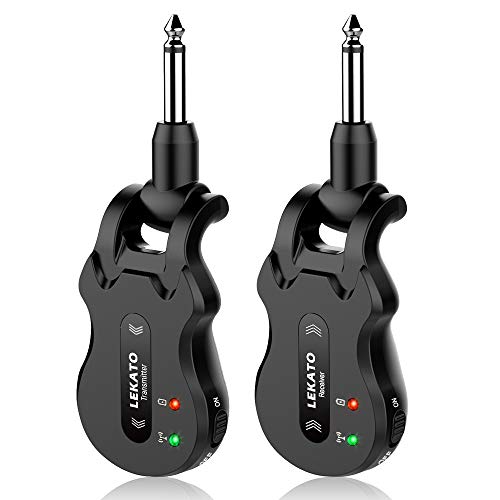Wireless guitar systems have been around since the mid 1970s. I grew up watching many of my guitar heroes use them as they strutted around on stage. Once I began to play small gigs, I quickly realized how great these systems can be.
Even if you’re not moving around a lot, it just makes things more neat and tidy. There’s one less tripping hazard to worry about and no need to untangle cables before the show.
Technology for these systems keeps getting better, and more affordable as well. I know a lot of fellow electric guitar players who use a wireless system even though they mostly play at home. Nowadays, there are less cords in the world in general as everything seems to connect wirelessly.
If you’re thinking of going wireless, stick with me for this Lekato Wireless Guitar System review, and we’ll take a look at one affordable option.
Exploring the Lekato WS-50: A Comprehensive Review
In this Lekato WS-50 review, we delve into the features and performance of this wireless guitar system to determine its suitability for both stage performances and home practice setups.
Lekato Wireless System Overview
This wireless unit was built specifically with the electric guitar in mind, but it will work with some other instruments. I’ll get to that a bit later. Opening the package, you’ll find a receiver, a transmitter and a USB charging cable. The plug end features a 220-degree rotating design. This ensures it will fit into the output jack of most guitars.
I was able to plug it into a Fender Stratocaster, a Jackson Dinky and a Gibson Les Paul with no issues. This system is as simple as it gets. You connect the transmitter to your instrument and the receiver to your amplifier.
Each unit is small and reasonably discreet. I could somewhat hide mine behind my guitar strap. The system offers 24-bit, 48 kHz high-quality audio broadcasting.
Build Quality and Durability
Upon opening the package, my first impressions were that the units felt cheap. They’re lightweight and mostly plastic, though I suppose you wouldn’t really want the transmitter to be too heavy.
My main concern, however, was how well they worked. There are units by brands like Shure that feel more solidly built, but they’re also a lot more expensive than this set by Lekato.
These aren’t terrible, but I worry about them holding up with a lot of use during live shows. Things tend to get banged around going to, during and coming from gigs. The jacks feel solid and plug firmly into a guitar and an amplifier or pedal board.
Another concern I have is that a number of reviewers reported that the units stopped working after only a few weeks. Since the majority of reviews out there are positive, I can only assume that this is a quality-control issue.
Most units should have no problems, but this is something to be aware of. Fortunately, Lekato does have a decent warranty policy.
Ease of Setup
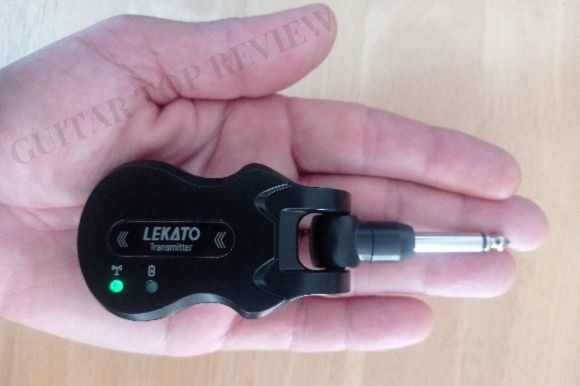
Pairing the units and setting up this system couldn’t be easier. First, you’ll need to charge the units. Lekato provides a double-headed cable so you can charge both units at the same time. A red light indicated that the units are charging. A green light lets you know that they’re ready to go.
Once charged, connect the transmitter to your electric guitar and the receiver to your pedal board, effects processor or directly to your amp. Turn on the units and a green light will flash until the two units are paired.
If this doesn’t immediately work, you’ll want to turn on the units and then press the sync button on the receiver until it flashes rapidly.
Next, press the sync button on the transmitter. When both lights become solid green, you’re all set. I have to say that I really appreciate just how simple this is compared to other systems I’ve used in the past.
Battery Life
Lekato rates the battery life at around five hours for this system. In my personal testing, I found this to be accurate. Each unit has a built-in lithium battery.
Charging is simple enough, and the charging time is rather quick. The package includes a dual USB cable, ensuring quick and convenient recharging. I’ve used other systems that last much longer, but really, five hours should cover most gigs and band practices.
Compatibility
This system should be compatible with most guitars. As I previously mentioned, the rotating jack easily fits into three of my electric guitars, including a Stratocaster.
The front jack input of a Strat is sometimes incompatible with equipment due to its unique shape and placement. That wasn’t a problem here. I also tested the system with an acoustic-electric that uses a Piezo pickup under the saddle. It worked flawlessly.
I brought the Lekato system with me to a band practice and let some of my fellow musicians try it out. One used it on a bass guitar while another bandmate tested it on a guitar with active pickups. The system worked perfectly on both of these instruments.
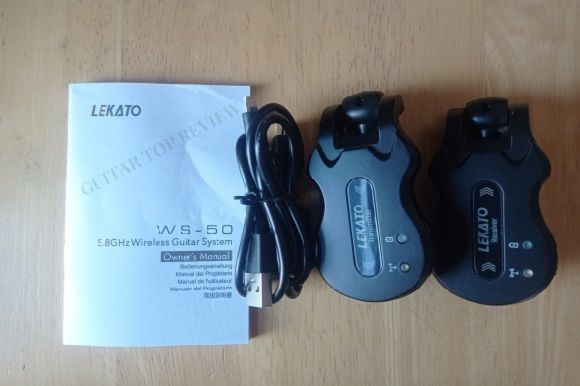
Sound Quality
This wireless guitar system broadcasts in 24-bit and 48 kHz. The sound quality is excellent. I tested the system with multiple guitars going through my main pedal board, as well as a couple of different processors. I also plugged it directly into a half-stack and a few different combo amps.
I played clean, a little bit dirty and with an extreme amount of gain. I spent time playing in all of these configurations with the Lekato system followed by a good old-fashioned cable. I couldn’t tell any difference in sound quality at all, and that’s exactly what you want from a wireless setup.
Wireless Range & Signal Reliability
The Lekato Wireless Guitar System has an advertised range of 100 meters. This is significantly greater than any system I’ve ever used. Even expensive systems tend to give you a range between 60 to 100 feet, at best. This claimed effective range was so great, that I had trouble believing it.
I personally tested the range until I ran out of yard space. I didn’t want to be standing around in the street, so I was only able to test the range up to about 50 meters.
The system worked flawlessly without any signal loss or noticeable latency. Speaking of latency, Lekato maintains that any lag will fall within 6 milliseconds. No normal human being could ever detect such a small amount of lag.
Channels and Interference
This Lekato 5.8 GHz wireless guitar system is a bit different from most systems that broadcast over 2.4 GHz. Using 2.4 GHz has a number of benefits. It produces a strong signal with a long range. Using 5.8 reduces the range, but increases the speed of a transmission.
The use of 2.4 GHz is extremely common for good reasons, but its common use can also be its downfall. Using 5.8 GHz makes the Lekato system less prone to interference from other devices such as wireless routers.
This system has four channels, which means four bandmates can use these systems at the same time. While I didn’t personally test this system with that many units, I would stick to only two or three at a time.
This is based on experience with a wide array of different systems over the years. Three seems to be a sweet spot to avoid audio bleed-over from one system into another.
Warranty and Support
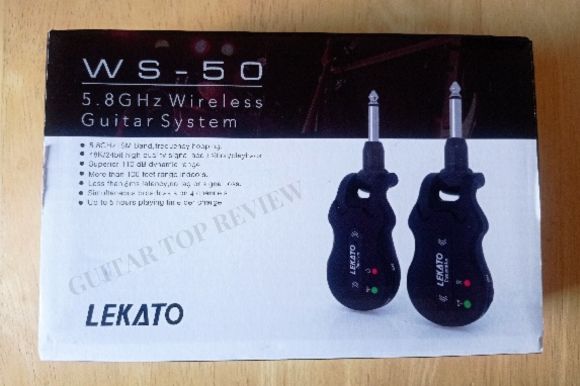
Lekato states that all of their products are covered with a minimum 6-month warranty. If your product is unused and undamaged, you can return it within 30 days for a full refund. If it’s past the 30-day period, but within 6 months, you can contact Lekato’s customer service team on their website or via email.
If you discover a defect and wish to contact customer service, they ask that you be ready to provide details and proof of purchase. If it’s past 30 days, they may require you to provide photos or video to show the defect. Their team will then decide on the best course of action, which may include a repair or replacement.
A few exceptions apply to the warranty rules. It’s pretty standard stuff like damage caused by normal use or accidents is not covered. Unauthorized repairs may also void your warranty.
Pros and Cons:
Pros:
- This system is affordable
- No detectable latency
- 5.8 GHz means less interference
- It’s rechargeable
- The system is easy to sync
Cons:
- Build quality could be better
- Battery life is on the short side
- Some users have reported quality-control issues
Alternatives to the Lekato Wireless Guitar System
Now that we’re almost at the end of my review of the Lekato WS-50, it’s time to consider some alternatives.
One model worth talking about is another wireless system by Lekato. The Lekato WS-100 is a 2.4 GHz system with some interesting features. It comes with a handy charging box to store and transport the receiver and transmitter in. The box can fully charge the two units a couple of times before you need to recharge the box itself.
If you play a lot of live shows and are starting to get booked at bigger venues, it might be time to invest in a more expensive, pro-level wireless system.
I’ve been using the Boss WL-50 for a while now, and it’s been excellent. The receiver fits seamlessly on my pedal board. I highly recommend this unit, but keep in mind, it costs about four times what the Lekato system costs.
Another good pro-level option is the Shure GLX-D16. Shure has been the gold standard of wireless systems for over a decade now. You really can’t go wrong with any of their wireless products, provided you can afford them.
Is It Worth Buying?
I would recommend this wireless guitar system by Lekato with a few caveats. I’m still a little concerned about possible longevity issues or quality-control issues.
Still, the unit is extremely affordable for how well it works, and Lekato offers a decent warranty if you happen to get a bad one. The majority of reviewers online seem to have had good experiences with the system.
If you’re starting to play small gigs, then this is an easy recommendation. It’s so cheap and easy to use. It also works surprisingly well for a wireless system in its price range. It can even be a good choice if you really just want to simplify things at home.
If you want less clutter in your home studio, and one less cord to trip over, this is a good, affordable solution. If you’re playing bigger venues, then save up some money and invest in a professional system.
Recommended to Read:
About the Author
Fabian, a Brazilian guitarist now based in Dublin, Ireland, has passionately played the electric guitar since 2003. As a luthier and product specialist, he boasts nearly two decades of collaboration with top musical instrument brands. Fabian is a sought-after expert, sharing his extensive knowledge with fellow guitar enthusiasts.

